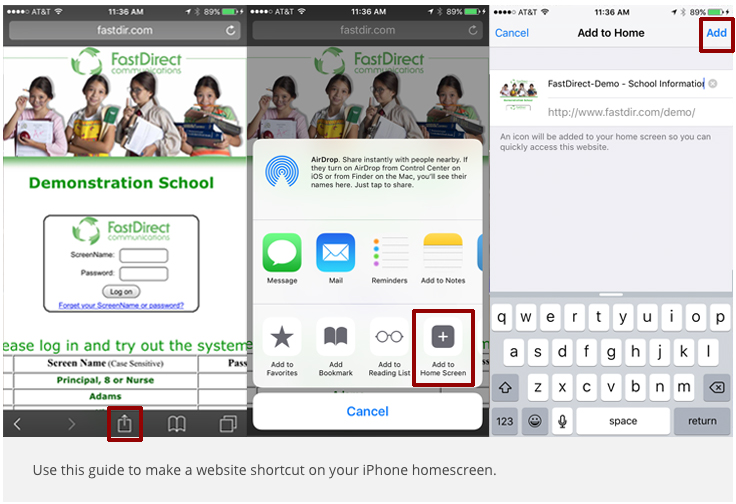A:
All parents can access their
FastDirect parent account via the Parent App.
Parents can download the FastDirect Parent App available either
in the Apple Store or in Google Play.
For any teachers, administrators, staff, or students, there isn't
currently an App but
these users can pin the FastDirect portal page to their home screen for
quick access.
How to Add Websites to the Home Screen
on Any Mobile Smartphone or Tablet
by How-To Geek
Your smartphone or tablet’s home
screen isn’t just for apps. Whatever
platform you’re using, you can pin your favorite websites to your home
screen so you can quickly access them.
Some platforms offer bonus features. For example, Chrome for Android
opens these websites in their own windows with no browser interface,
while Windows 8 and Windows Phone offer live tile updates on some
websites.
Android
Launch Chrome for Android and open the website or web page you want to
pin to your home screen. Tap the menu button and tap Add to homescreen.
You’ll be able to enter a name for the shortcut and then Chrome will
add it to your home screen.
The icon will appear on your home screen like any other app shortcut or
widget, so you can drag it around and put it wherever you like. Chrome
for Android loads the website as a “web app” when you tap the icon, so
it will get its own entry in the app switcher and won’t have any
browser interface getting in the way.
Other popular Android browsers also offer this feature. For example,
Firefox for Android can do this if you tap the menu button, tap the
Page option, and tap Add to Home Screen.
iPhone, iPad, & iPod Touch
Launch the Safari browser on Apple’s iOS and navigate to the website or
web page you want to add to your home screen. Tap the Share button on
the browser’s toolbar — that’s the rectangle with an arrow pointing
upward. It’s on the bar at the top of the screen on an iPad, and on the
bar at the bottom of the screen on an iPhone or iPod Touch. Tap the Add
to Home Screen icon in the Share menu.

You’ll be prompted to name the shortcut before tapping the Add button.
The shortcut can be dragged around and placed anywhere, including in
app folders — just like a normal app icon. (To create app folders on
iOS, touch-and-drag an app’s icon onto another app’s icon and hold it
there for a moment.) When you tap the icon, it will load the website in
a normal tab inside the Safari browser app.
Other browsers, like Chrome for iOS, don’t offer this feature. Due the
limitations in Apple’s iOS, only Apple’s own Safari browser is allowed
to do this.
Windows 8, 8.1, RT
Windows 8, 8.1, and RT devices also offer a way to pin websites to your
Start screen. This is obviously most useful on tablets, not on desktop
PCs where you don’t want to see the Start screen. On the Windows
desktop, you can pin website shortcuts to your taskbar for easier
access.
First, open the modern Internet Explorer browser — that’s what you’re
probably using on a tablet, anyway, as it offers the most
touch-optimized experience. Navigate to the website you want to pin,
pull up the app bar — for example, by right-clicking or swiping up from
the bottom of your screen — and tap the star icon. Tap the pin icon,
enter a name for the shortcut, and click Pin to Start. The website will
appear as a tile on your Start screen.
Tap the tile and the website will open in Internet Explorer. Some
websites offer live tile support — Windows will use an associated RSS
feed to display the latest headlines and updates from a site if you pin
it to your Start screen. Most websites haven’t been configured to
support this feature. If they have, you’ll see the updates after
pinning it to your home screen.
Windows Phone
The process is similar on Windows Phone. First, open the website you
want to pin in Internet Explorer. Tap the More (…) button and tap Pin
to Start in the menu that appears. Windows Phone 8.1 supports live tile
updates from websites that have configured the feature, just as Windows
8 does.
If you have another type of smartphone or tablet, it probably has this
feature, too. Just open its browser and look in its menu for an option
named something like “Add to home screen” or “Pin to home screen.”
To remove a website shortcut from your device’s home screen, just
long-press the shortcut and remove it like you would any other app icon. |
|
